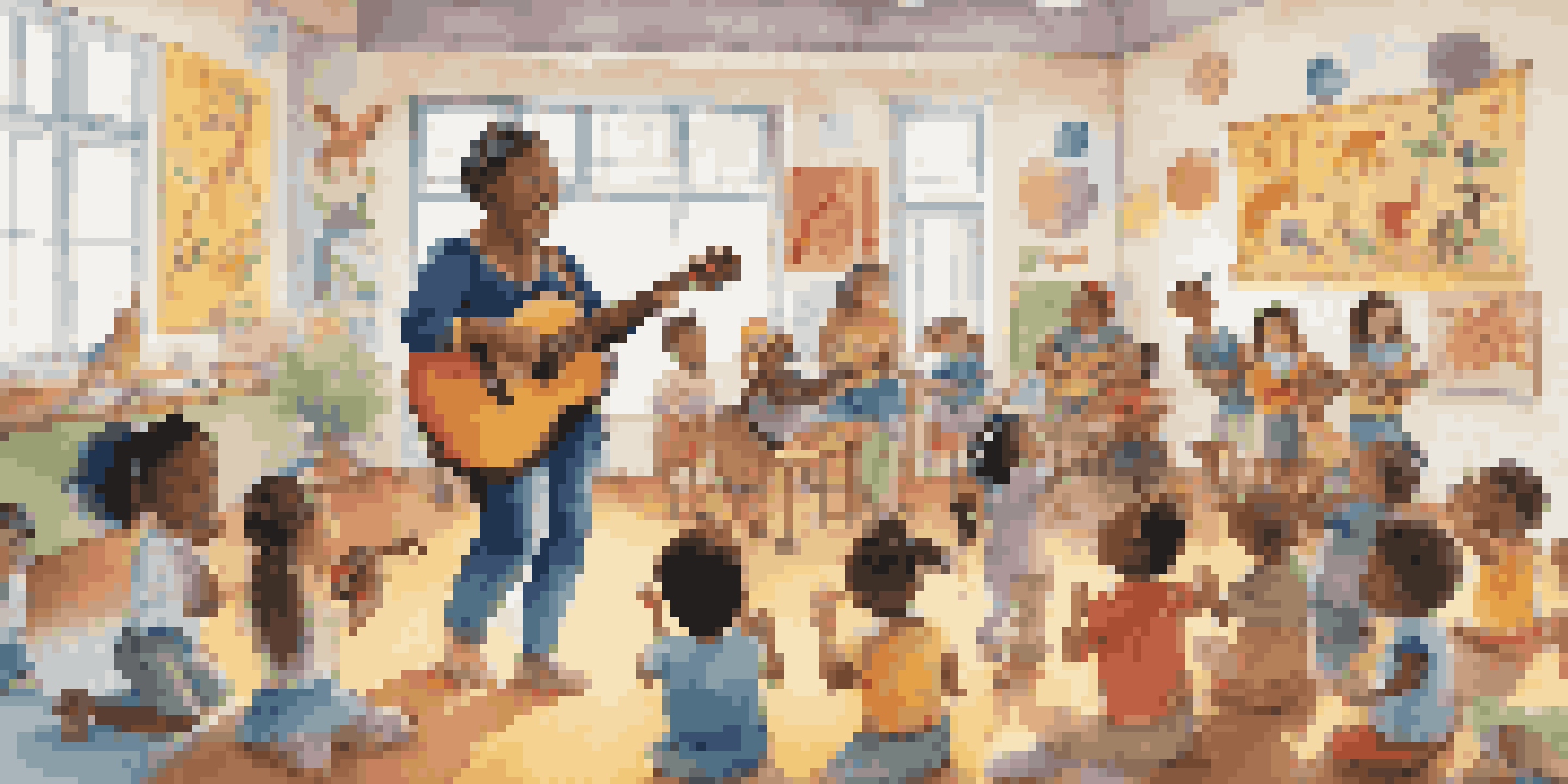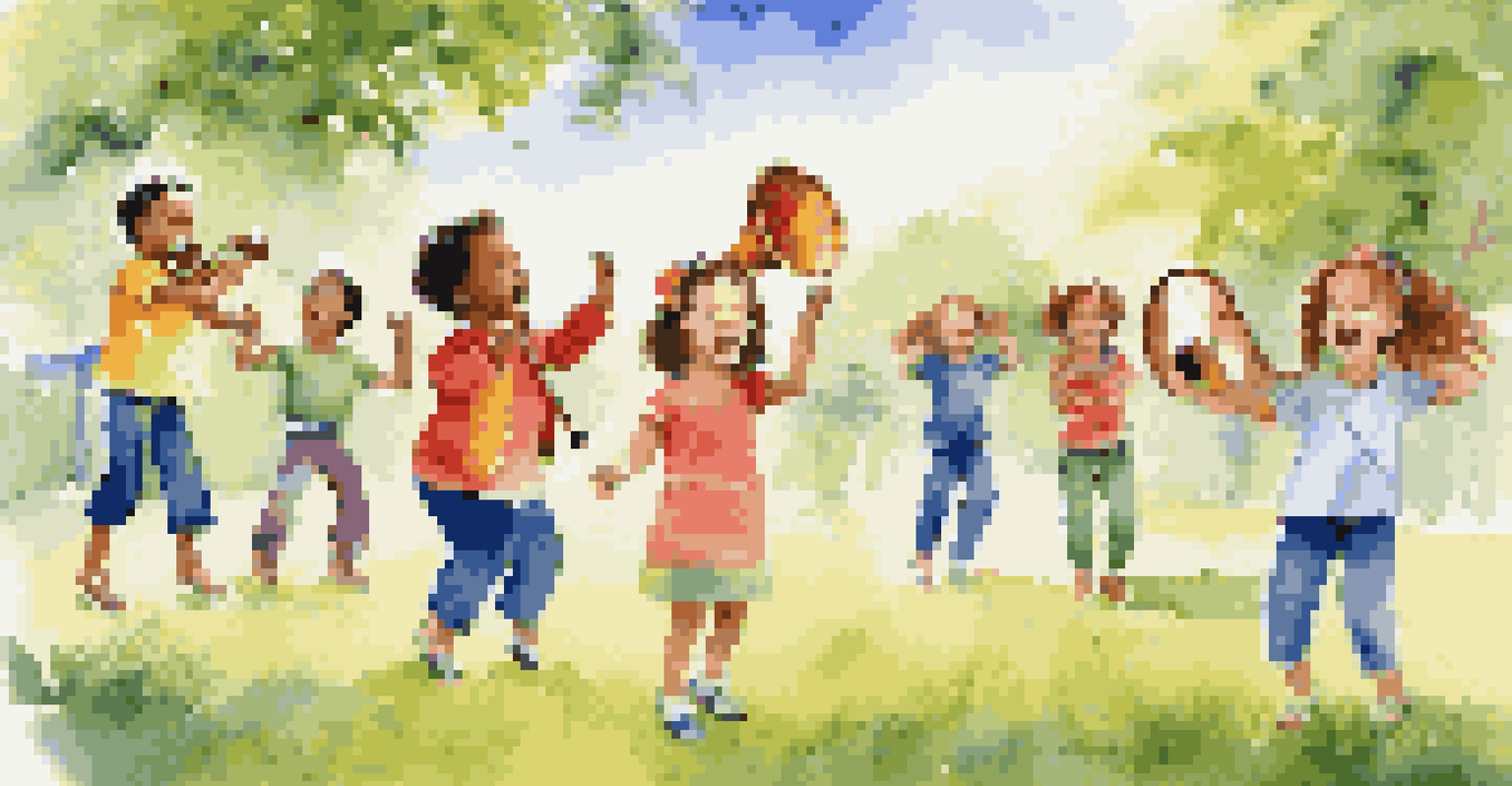The Effect of Songs on Vocabulary Acquisition in Young Learners

Understanding Vocabulary Acquisition in Young Learners
Vocabulary acquisition is a crucial part of language development, especially in young learners. This process involves not just memorizing words but also understanding how to use them in context. Children learn best when they engage with language in fun and meaningful ways, making songs a natural fit for this purpose.
Music can change the world because it can change people.
Songs provide a rhythmic and melodic structure that can help children remember new words. The repetitive nature of lyrics reinforces vocabulary, making it easier for kids to recall and use these words in conversation. This connection between melody and memory is why many educators incorporate music into their teaching strategies.
Moreover, songs often tell stories or convey emotions, which helps children to associate words with meanings. When kids hear a song about friendship, for example, they are likely to remember words like 'friend,' 'share,' and 'play' more vividly. This emotional engagement makes vocabulary acquisition not just effective but also enjoyable.
The Benefits of Using Songs in Vocabulary Learning
Incorporating songs into vocabulary learning offers several benefits. First, songs can capture children's attention more effectively than traditional teaching methods. When kids are engaged and having fun, they are more likely to absorb new information and retain it over time.

Another significant advantage is that songs often introduce new vocabulary within a familiar context. For instance, a song about animals can teach words like 'cat,' 'dog,' and 'bird' while also reinforcing concepts related to these animals. This contextual learning allows children to make connections that enhance their understanding.
Songs Enhance Vocabulary Learning
Incorporating songs into vocabulary learning makes the process engaging and memorable for young learners.
Additionally, songs can foster a love for language and learning. When children enjoy the process of acquiring new words through catchy tunes, they are more likely to seek out new words in other contexts. This intrinsic motivation can lead to lifelong language skills and a rich vocabulary.
How Repetition in Songs Aids Vocabulary Retention
Repetition is a key element in both music and vocabulary learning. Songs often repeat phrases or choruses, which helps reinforce the words being taught. This repetition allows young learners to internalize vocabulary without the pressure of rote memorization.
The more that you read, the more things you will know. The more that you learn, the more places you'll go.
When children sing along to their favorite songs, they are practicing the pronunciation and rhythm of the language. This practice can lead to improved speaking skills and greater confidence in their language abilities. It’s like having a fun language lesson wrapped in a catchy tune!
Moreover, the more children hear and sing a word, the more familiar it becomes. This familiarity leads to quicker recall during conversations or reading. Thus, the repetitive nature of songs not only makes learning enjoyable but also significantly boosts retention.
Engaging Different Learning Styles with Music
Every child has a unique learning style, and music can cater to various preferences. For auditory learners, songs provide an excellent way to absorb new vocabulary through listening. Visual learners can benefit from the colorful imagery often associated with music videos or lyric sheets.
Kinesthetic learners, who thrive on movement, can engage with songs through dance or actions that accompany the lyrics. This physical engagement helps solidify vocabulary in their minds, making learning a more dynamic experience. It’s all about finding what resonates with each child.
Repetition Boosts Word Retention
The repetitive nature of songs helps children internalize vocabulary, improving recall and confidence.
By using songs that appeal to different senses, educators can create a rich and inclusive learning environment. This approach fosters not only vocabulary acquisition but also a love for language that can last a lifetime.
Creating a Song-Based Vocabulary Curriculum
Building a vocabulary curriculum around songs can be an effective strategy for educators. Start by selecting songs that contain rich vocabulary and are appropriate for the age group. Consider incorporating a mix of genres to keep things fresh and exciting.
Once you have your song list, create activities that allow children to engage with the lyrics. This could include filling in missing words, acting out the song, or even writing their own lyrics based on familiar themes. These activities deepen their understanding and reinforce their learning.
Finally, encourage children to share their favorite songs with peers. This collaborative approach not only fosters a sense of community but also exposes them to new vocabulary through their classmates’ choices. It creates an interactive learning experience that keeps children motivated.
Real-Life Examples of Songs Enhancing Vocabulary
Many educators have successfully used songs to boost vocabulary in their classrooms. For example, the popular children's song 'Old MacDonald Had a Farm' introduces animal names and sounds while allowing children to participate actively. This interactive element makes vocabulary memorable.
Another great example is 'Head, Shoulders, Knees, and Toes,' which teaches body parts in a fun and engaging manner. Children not only learn the words but also associate them with movement, reinforcing their understanding through action.
Catering to Different Learning Styles
Music can cater to various learning styles, making vocabulary acquisition a more dynamic and inclusive experience.
These real-life examples highlight how songs can transform vocabulary learning into an enjoyable experience. By integrating music into lessons, teachers can make a lasting impact on their students’ language development.
Challenges and Considerations in Using Songs
While using songs for vocabulary acquisition is beneficial, there are some challenges to consider. Not all songs are suitable for educational purposes; some may contain complex vocabulary or themes that are inappropriate for young learners. It's essential to choose songs carefully to ensure they align with learning objectives.
Additionally, some children may not respond positively to music, either due to personal preference or learning differences. It’s important for educators to diversify their teaching methods and incorporate other activities alongside music to cater to all learners.

Finally, be aware that children may learn vocabulary differently based on their exposure to songs outside the classroom. This variance can impact their understanding and usage of words. Regular assessment and feedback can help teachers adapt their approaches to meet the needs of each student.